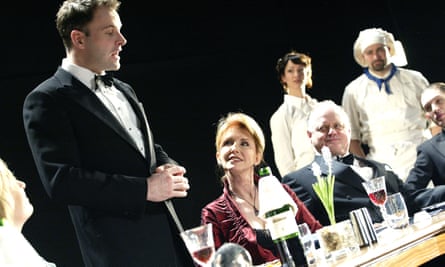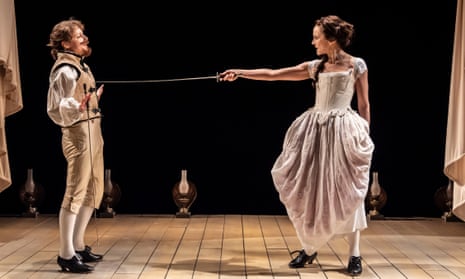Rachael Stirling picks her way from the back of the stage, joins her colleagues in the stalls, and then promptly bursts into tears. “I’m tired,” she explains. Stirling is playing Sarah Siddons, the great 18th-century actor, in The Divine Mrs S at the Hampstead theatre in London, and we’re chatting right in the middle of the preview period. It’s a fraught time.
“We still haven’t cracked it,” Stirling says mournfully. “You have!” exclaims director Anna Mackmin. “You’ve so cracked it.” “I love what you do,” adds April De Angelis, the playwright. “I’ve been sending you messages all night,” Mackmin continues. “Breathe. That’s it, baby, you’re worth the ticket price.” “Here I go again,” says Stirling, crying and laughing at once. Mackmin looks over to me and says: “This is what previews are.”
In Siddons’ day, plays lived or died by their first performance. The town’s judgment could kill a production stone dead – as happens in De Angelis’ play. It’s still true in ballet and opera: however technically complex, the first public show is usually also press night.
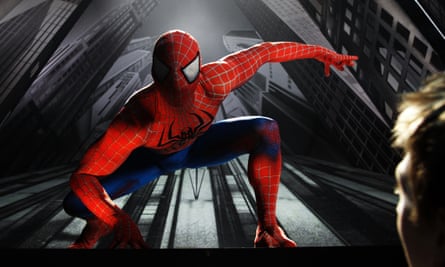
West End and Broadway shows used to open out of town, fine-tuning in Brighton or Boston. However, when the 1952 musical Wish You Were Here and its onstage swimming pool proved too big to travel, it instead played for nearly four weeks on Broadway before opening night. In 1966, Cabaret was the first show to offer lower priced preview tickets. Nowadays, shows typically have several previews where work continues, supposedly out of the public eye (though social media mean that what happens in previews no longer stays in previews).
Infamously, the Broadway musical Spider-man: Turn Off the Dark had 182 previews before its official opening in 2011: the score was rewritten, actors injured and director Julie Taymor abruptly fired. Major changes still occur: this year, The Enfield Haunting reportedly shed over 30 minutes during previews (but couldn’t dodge a critical drubbing). Opening Night, starring Sheridan Smith, also slimmed its running time – ironically, it’s a musical about a turbulent preview period on Broadway.
More typically, previews are welcome. “The two key learning moments for a playwright,” says writer David Eldridge, “are when you first hear actors read the script, and when the play meets an audience. In British theatre, we’re incredibly rigorous in the rehearsal process. But somehow, when you put it in front of an audience, it exposes unnecessary overwriting. Even after all the rehearsals, cuts only become fully clear in preview.”
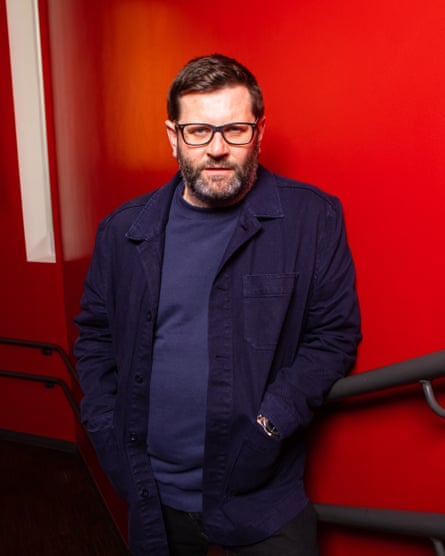
Beginning, his 2017 relationship drama, had “a really stunning first preview – but was a classic example of having worked with the utmost rigour for five weeks and then suddenly discovering that we could cut a page and a half towards the end.”
Audiences are meticulously observed for how a play lands. “You watch them with a beady eye,” De Angelis agrees. “You get a big blast of objectivity, because they have no skin in the game. You’re reading the play through the audience and it helps to firm it up. We made some good cuts yesterday – I thought, ‘Yeah, it was just blathering on.’”
I saw the very first preview of The Divine Mrs S. The theatre was busy and the mood almost raucous, surprising the actors with bellows of laughter. “They were a delightful, very warm audience,” Mackmin says. “It was wilder than I thought it would be. We’re now trying to give it an energy that’s a bit less like a gig, trying to work on the nuts and bolts and the clean storyline. It’s been a slalom ride – regaining that rock’n’roll energy but being in charge of it a little more.”
She turns to Stirling. “You need to do a tiny percentage less in some places. It’s the smallest adjustment, it really is. Please do not unmake your performance.” Sharing a play with its public is a test – previews tell you where to bend and where to hold your nerve. “There are never enough previews for a new play,” Mackmin says. “The danger is that you fall out of love with it, so a large part of my job is to knit all the strands back into one gorgeous thread. And never mind the press.”
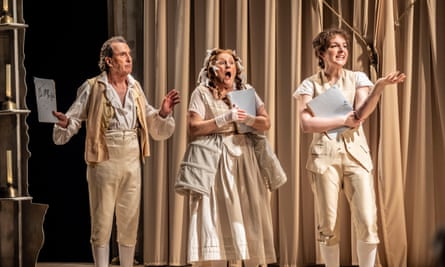
De Angelis remains stoical through this febrile period. “What can you do? You have to hold on to why you wrote it in the first place. Some people will like it, some won’t. You have to be grown up about it.” Eldridge, however, admits to being “incredibly stressed on the first preview. I tend to feel so freaked out that the play’s finally got some real people watching. Invariably some alcoholic nerve-steadying has gone on.” When Beginning launched at the National Theatre, his best mate took him for a beer or three beforehand. “It was absolutely brilliant to be nowhere near the theatre.”
While other creatives watch from the dark, actors must still deliver a performance. “You’re letting in the main character, the audience,” Stirling says. “I was gagging for an audience – especially because it’s a comedy. I was hungry to have people to play with. Though you always wonder: who comes to the first preview?” Hampstead’s crowd indulged the odd flubbed line or costume malfunction – as when Stirling’s skirt came adrift. “I sort of love it when things go wrong,” she says. “That’s why you come to a live show.”
It’s rare that an actor is in both the cast and audience. Last year, Rilwan Abiola Owokoniran took on the central role in Beautiful Thing, Jonathan Harvey’s gay coming-of-age classic, just three days before previews, after the original actor pulled out. Still absorbing the role, he watched his understudy in previews. “I had no choice but to view the first few performances as sort of an open rehearsal. It was nice to see the shape of the performance, where I needed to put my energies.”
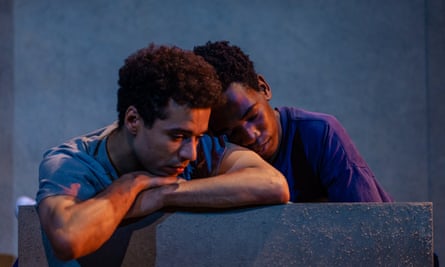
Big on laughs and tears, Harvey’s play invites a strong response. “It was absolutely palpable,” Owokoniran says. “I love that education from the audience. With Beautiful Thing, in my worry and my fear of everything, I failed to realise it was comedy. It is such a heavy story, I went into it with the solemnity that it deserved – so hearing them laugh on the first line was so reassuring.”
Eldridge says that previews can disconcert actors. “Audiences do make judgments about characters and their actions,” he says. His 2012 play, In Basildon, about an Essex family, includes a “posh young playwright” – and actor Max Bennett “was completely shocked how much the audience disliked his character. In rehearsal, actors try to inhabit and empathise with their characters. So I think Max felt quite thrown by how much the audience took against him.”
Eldridge saw that response coming – but was surprised when the first audience for Middle, from 2022, judged a wife “a bit more harshly than we intended” when she decided to leave her struggling marriage. “I was thrown, so I made some cuts for the next previews.”
Critical judgment is another matter – the Hampstead team admit they feel the looming pressure. Sometimes, previews don’t reflect the critics’ response. “The most surprising one was Private Lives that I just did,” Stirling says. This was at the Donmar in London. “The reception was brilliant in previews. We’d made it sexier and naughtier and dirtier, which Noël Coward would have wanted. And then on the press night, it was like we’d shat on a national treasure.”
